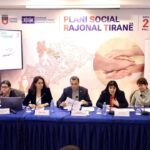Regional Social Plan of Tirana Region
Regional Social Plan of Tirana Region- A Significant Step for Social Well-being ( December 2024 – March 2025 )
In an effort to improve social services and address the needs of the most vulnerable groups, ASET Center, in collaboration with Tirana Region, developed the Regional Social Plan – a strategic document that serves as a roadmap for social policies and interventions within its territory.
In recent years, the social dynamics in Tirana Region have reflected new and intensified challenges, such as the lack of services in certain rural areas, a high concentration of vulnerable groups in urban zones, inequalities in access to and quality of social services, and the need for more coordinated interventions in addressing inter-municipal issues.
In light of these developments, the creation of a regional instrument became necessary—one that serves as a compass for planning and implementing local and regional-level social interventions, helping to ensure broader and more effective coverage of community needs. This instrument was developed in close collaboration with local institutions, social services, civil society organizations, and the community, with the aim of building a more integrated and sustainable social services system.
Regional Social Plan focuses on strengthening coordinated approaches among municipalities, improving institutional and professional capacities at the local level, and establishing joint intervention mechanisms. Through this document, Tirana Region aims to guide the actions of the Regional Council in supporting municipalities with the planning, development, and monitoring of social services in the territory, helping to identify existing gaps, reinforce priority interventions, and facilitate inter-institutional cooperation.
Regional Social Plan is built upon several key principles: inclusiveness and active participation of local actors, co-ownership in decision-making processes, reliance on accurate data, and flexibility to adapt interventions to evolving needs over time. It is supported by close institutional cooperation between the Regional Council, municipalities within the territory, central institutions, and civil society organizations, aiming to create an effective platform for the development and expansion of inclusive social services.





